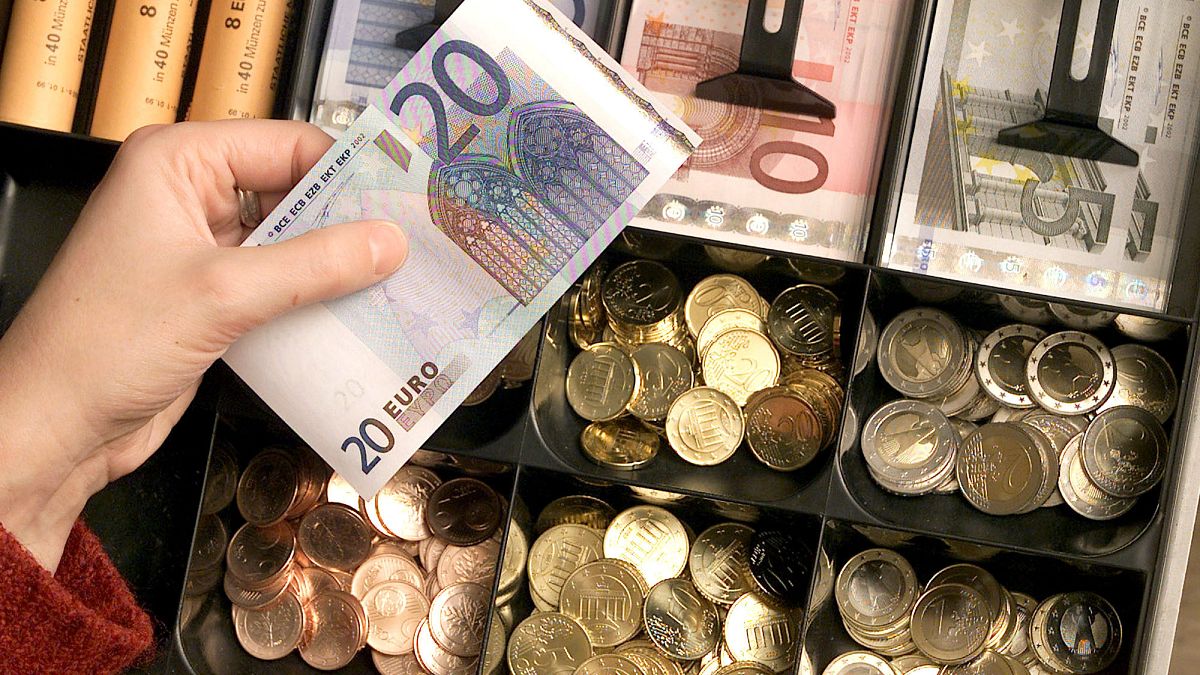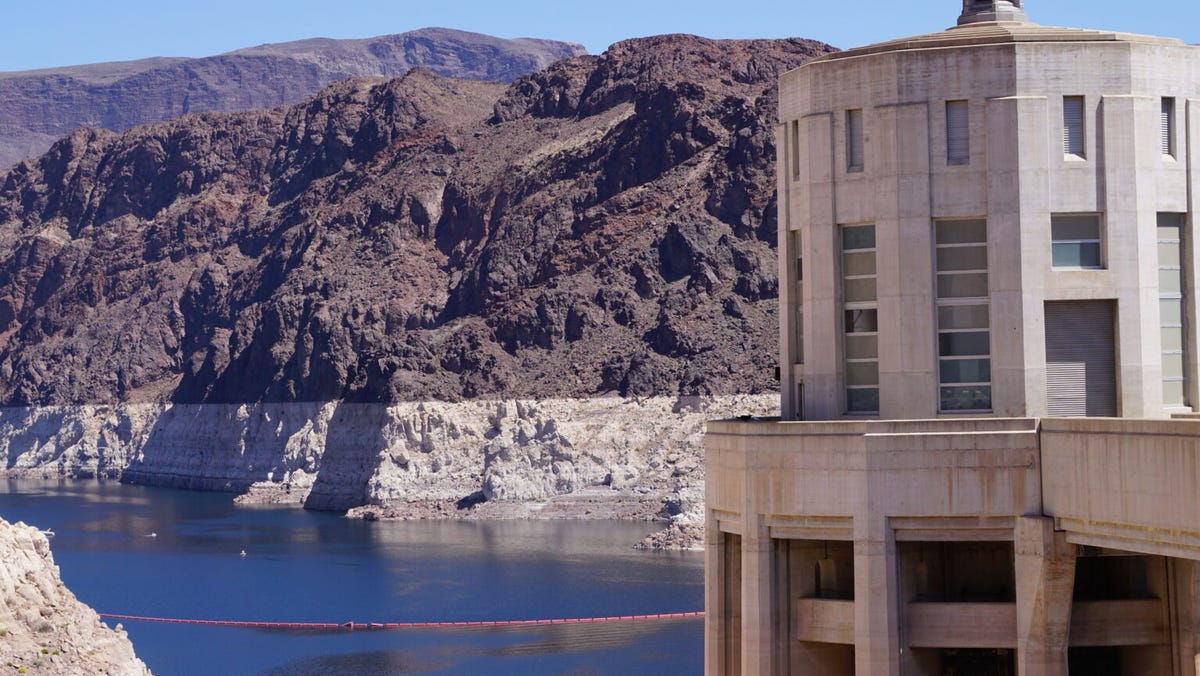World
MEPs to debate Spain’s amnesty deal over rule of law fears
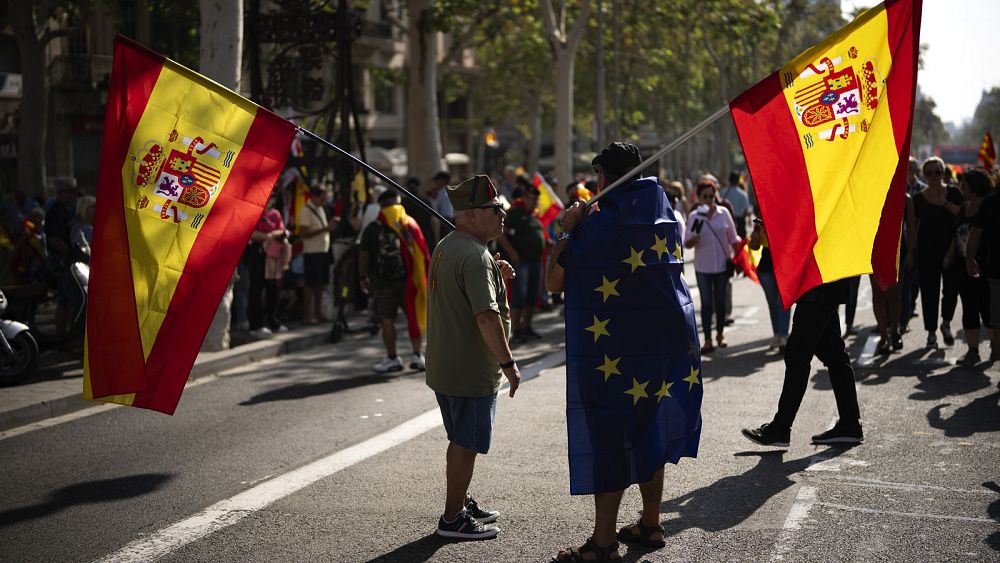
The European Parliament will hold a debate next week on the controversial amnesty deal struck between the Spanish socialists and Catalan separatists to make Pedro Sánchez prime minister.
The debate has been requested by the parliament’s biggest group – the centre-right European People’s Party (EPP) – amid concerns about what it describes as “the beginning of the end for the rule of law” in Spain.
In a joint statement, the EPP’s president Manfred Weber and the head of its Spanish delegation Dolors Montserrat said that the “amnesty pact risks breaching the separation of powers and undermining judicial independence,” echoing concerns voiced in recent days by Spain’s national council of the judiciary.
The EPP will likely secure the support of other right-leaning and centrist groups before the debate can be formally included in the agenda for next week’s plenary sitting.
The Spanish socialists’ deal, announced in Brussels last Thursday following weeks of intense negotiations, will see Catalan separatist party Junts per Catalunya (JxCat) offer seven of its votes to back a Sánchez-led government in exchange for a future amnesty for Catalan politicians and activists who participated in a failed attempt at secession from Spain in 2017.
It has drawn fierce criticism from opposition parties, who accuse Sánchez of undermining the rule of law by absolving crimes including embezzlement and maladministration for political gains.
Tens of thousands of protesters took to the streets in Spain over the weekend in protest.
The amnesty bill was submitted before the Spanish parliament by the socialist party (PSOE) on Monday ahead of the vote on Sánchez’s investiture, scheduled for Wednesday and Thursday this week (15 and 16 November).
A draft version of the bill shared by Spanish outlet eldiario.es on Monday suggests that the controversial concept of “lawfare”, included in the political deal with JxCat in a major concession to Puigdemont, will not feature in the legal text of the amnesty bill.
Twenty right-leaning and centrist Spanish members of the European Parliament (MEPs) also wrote to European Commission chief Ursula von der Leyen on Monday to denounce the deal for undermining the principle of equality before the law, and call on the EU institutions to “monitor and follow” the situation in Spain.
“The European Union should safeguard its fundamental principles and values and take steps to protect the rule of law,” in accordance with the Union’s treaties, the letter also says.
The MEPs claim that judicial proceedings and sanctions against 3,000 people would be scrapped as a result of the amnesty, including for crimes relating to corruption and terrorism.
‘Lawfare’ under scrutiny
The EPP-requested debate in the European Parliament will likely focus on the clause in the political deal that refers to ‘lawfare’ – the strategic use of the law as an instrument to target political opponents – included under the request of JxCat’s leader Carles Puigdemont, who fled in exile to Belgium following the failed 2017 referendum.
According to the deal, parliamentary commissions would be established specifically to investigate whether any of the legal convictions made in relation to the 2017 secession attempt could be considered attempts at “lawfare”.
But leaked drafts of the amnesty bill shared by Spanish media on Monday suggest the term will not appear in the legal text, as previously affirmed by Jaume Asens, the negotiator on behalf of the socialists’ coalition partner Sumar.
The inclusion of “lawfare” in the political deal has nonetheless been at the heart of criticism from analysts and legal experts, who say it would allow judicial decisions to be subjected to political interpretation, thereby significantly undermining the independence of the judiciary.
“As the associations of judges and prosecutors have claimed, it is nothing less than a serious threat to the judicial independence in Spain,” the EPP group said on X.
“We have seen this before in Poland and we expect the European Commission to immediately make clear that for example the lawfare provisions are totally unacceptable,” the group also said.
In their letter to von der Leyen, 20 MEPs say that all Spain’s judicial associations, “from the most progressive to the most conservative” have rejected the reference to lawfare in a joint statement.
The European Commission has refrained from commenting on the deal until the legal text of the amnesty bill is made available.
A letter sent last week by the EU justice commissioner Didier Reynders to Spanish ministers requested “more detailed information, notably as regards the personal, material and temporal scope of this envisaged law.”
In response, Spain’s Presidency Minister Félix Bolaños said that the amnesty bill was a proposal from the parliamentary groups, and that the current caretaker status of the government prevented it from submitting bills to the parliament.
But with an investiture pencilled in for this week and the bill expected to be registered on Monday, the EU institutions will come under increasing pressure to take a position on the deal.
The bloc has in the past taken a strong stance on laws considered to undermine the rule of law and the independence of the judiciary in countries such as Poland.
“We count on the European institutions as a space of democracy and freedom to stop this pact, which breaks the rule of law and the equality of citizens in Spain, as they have done before in other countries,” the EPP said.

World
Dan Schneider Files Defamation Suit Against Quiet on Set Producers, Says Docuseries Is a ‘Hit Job’

ad
World
University of Tehran professor says protesters at US colleges will support Iran in American conflict
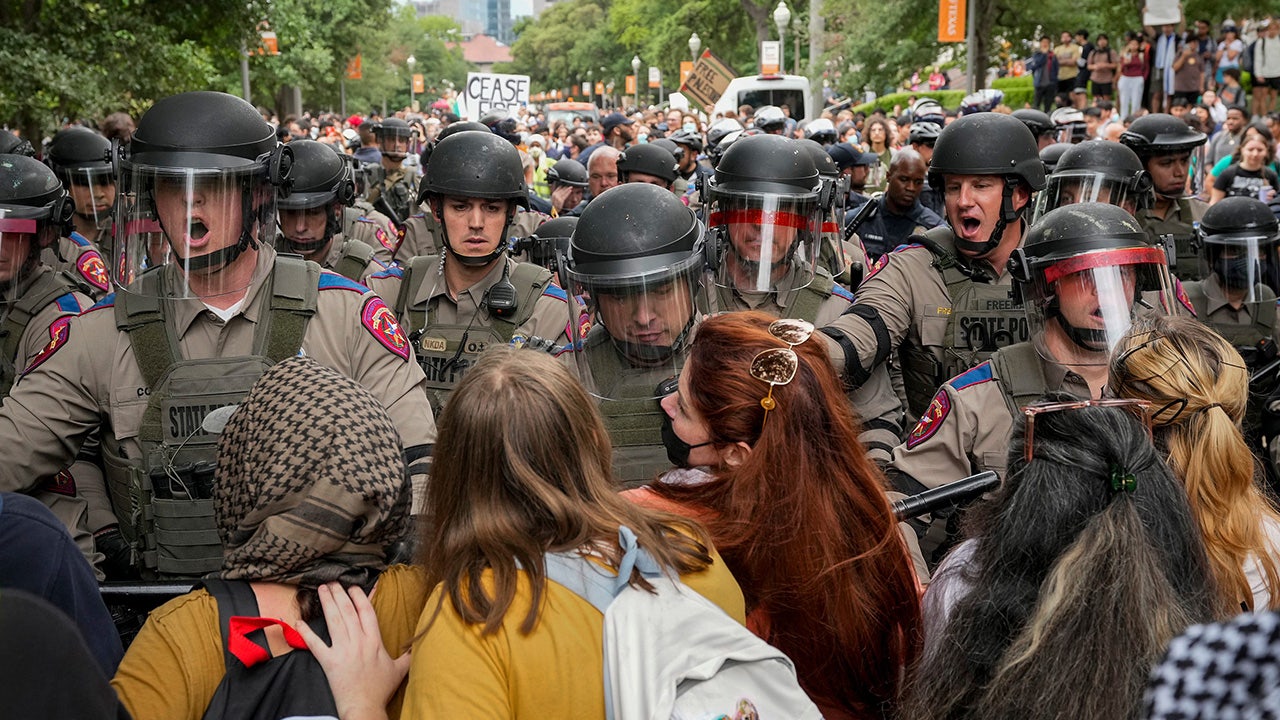
Anti-Israel protests erupt at Fordham University
Fox News correspondent Alexis McAdams reports on anti-Israel protests at Fordham University and the aftermath of NYPD officers clearing out protesters from Columbia University’s Hamilton Hall on ‘Special Report.’
A University of Tehran professor said in an interview that Iran likes seeing protests on U.S. college campuses, adding those are their supporters if there is ever a conflict between the two countries.
Professor Foad Izadi, who, according to the University of Southern California Center on Public Diplomacy, earned his master’s degree from the University of Houston, was seen in a video being interviewed about the protests in the U.S.
“Sooner or later, this kind of support for the Zionist regime by the American regime will diminish. It might not stop completely, but its diminishing is important,” he said. “This is why the demonstrations [on U.S. campuses] are important.”
Izadi spoke as a member of the Islamic Republic, and oftentimes said, “we,” referring to him and the republic.
TRUMP SAYS 4 WORDS ABOUT ANTI-ISRAEL PROTESTS ON COLLEGE CAMPUSES AS ARRESTS SKYROCKET
State troopers in riot gear try to beak up an anti-Israel protest at the University of Texas on Wednesday, April 24, 2024. (Jay Janner/American-Statesman)
“We are watching the demonstrations and like what we see, but it should not end with this,” Izadi said. “If not for the Islamic Republic, the case of the Palestinian idea would have been closed years ago. The idea of resistance belongs to Iran, but on the operational level, when it comes to recruiting connections and building networks, the [Iranian] state has not been involved in a sufficient level.
“These (American students) are our people,” he continued. “If tensions between America and Iran rise tomorrow or the day after, these are the people who will have to take to the streets to support Iran.”
Izadi said there are Hezbollah-style groups in the U.S. that are much larger than those in Lebanon.
VIDEO SHOWS ANTI-ISRAEL PROTESTERS BLOCK JEWISH STUDENT FROM GETTING TO CLASS; UCLA RESPONDS
“America is the Great Satan and our main enemy, but we have hope in these areas,” he said.
Iran expert and Foreign Desk Editor-in-Chief Lisa Daftari provided insight on Izadi’s comments.
“Quite rich to see the same regime that is fixated on torturing, raping, blinding, executing its own college students, is applauding the ignorant college students on American campuses,” she said. “It speaks to their focus on growing their influence outside of Iran.”
UCL ANTI-ISRAEL PROTESTERS ASK SUPPORTERS FOR VEGAN AND GLUTEN-FREE FOOD, ZIP TIES, SHIELDS AND EPIPENS
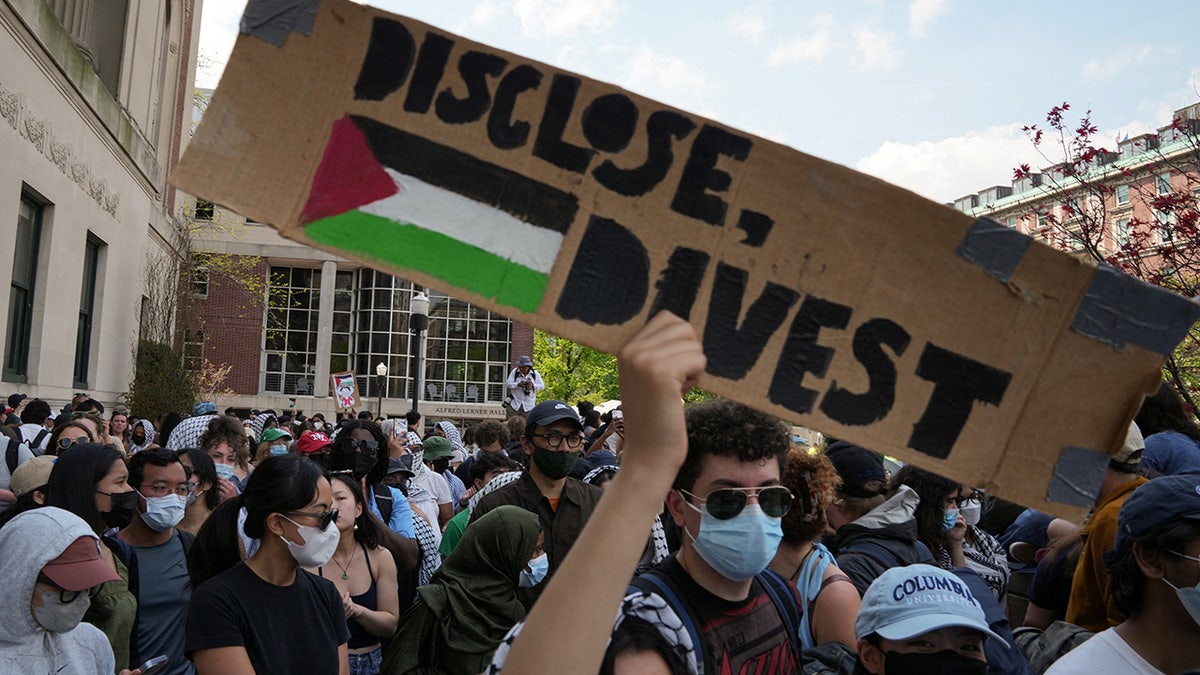
A protester holds a sign during a march on Columbia University campus in support of a protest encampment supporting Palestinians in New York City, April 29, 2024. (REUTERS/David Dee Delgado)
Daftari explained that Iran has been beefing up terror proxies in the region and paying their way into American universities.
But at the same time, she said, the Iranian people have suffered under the rule of their “barbaric” leaders.
After watching the comments, Daftari also said it was interesting to hear Izadi say they have more Hezbollah followers in the U.S. than in Lebanon.
“Regardless of when these pro-Hamas protests quiet down here in the U.S., it’s apparent the regime has its sights set on manipulating this momentum to launch more attacks here in the West,” she said. “The question then remains will they focus on a physical attack or just the information war, or both?”
World
France's May Day march turns into political arena ahead of EU election

Many left-wing contenders didn’t miss the opportunity to attend the traditional May Day protest in Paris, while the far-right politician Jordan Bardella, currently leading the polls, announced the rest of his candidate list in southwestern France.
The usual chants for higher salaries and equal pay echoed across the streets of Paris this Wednesday during the traditional May Day labour rights march.
Ten of thousands of protestors took to the streets of the French capital against a backdrop of new demands such as peace in Gaza and against the upcoming Paris Olympic Games.
But with less than six weeks left before the European elections on 9 June, the event turned into a highly political one.
Many left-wing candidates didn’t miss the opportunity to present their campaign, all vying for attention.
Representing the Communist party for the EU elections, Léon Deffontaine, the 28-year-old candidate is focusing his campaign on energy bills — a topic that catalysed numerous protests in France and Europe since Russia’s full-scale invasion of Ukraine.
“The first measure I want to put in place is to take France out of the European electricity market to reduce energy bills. Today, we’re paying far more than the price we pay to produce electricity,” he told Euronews.
Others emphasised the importance of protesting the rise of the far-right, currently leading the polls, represented by Jordan Bardella of the Rassemblement National party (RN).
“May 1st is also an opportunity to remember that we must always fight against these anti-democratic, anti-republican parties that unfortunately swarm our country,” said Marie Toussaint, leader of the Green Party for the 9 June elections.
According to a poll by IPSOS ordered by Euronews, Macron’s centrist alliance Renaissance is lagging by 15 points behind Bardella’s party.
Meanwhile, in the southwestern city of Perpignan, Jordan Bardella gathered more than 2,000 people to announce his party’s first 35 candidates for the elections.
These include candidates such as Fabrice Leggeri, ex-boss of Frontex, the European Border and Coast Guard Agency.
End of April, two NGOs filed a civil complaint against Leggeri accusing him of being complicit in crimes against humanity for enabling ‘pushback’ of boats full of illegal migrants between 2015 and 2022.
Bardella’s move was highly criticised by left-wing parties, claiming the far-right politician was taking away the attention from worker’s issues.
“Taking advantage of May 1st to launch a campaign shows that he couldn’t care less about French workers,” reacted Léon Deffontaines, the Communist candidate.
In Saint-Etienne (near Lyon), the head of the socialist party, Raphaël Glucksmann, was prevented from joining the march.
Multiple protesters threw paint and eggs at the EU election candidate, currently third in the polls after the far-right and Marcon’s centrist alliance.
In total, about 121,000 people marched across France according to the Ministry of the Interior, while the main labour union CGT claimed “more than 210,000” participated in the marches in the country.
-

 Education1 week ago
Education1 week agoVideo: Dozens of Yale Students Arrested as Campus Protests Spread
-

 News7 days ago
News7 days agoLarry Webb’s deathbed confession solves 2000 cold case murder of Susan and Natasha Carter, 10, whose remains were found hours after he died
-

 World6 days ago
World6 days agoHaiti Prime Minister Ariel Henry resigns, transitional council takes power
-

 Politics1 week ago
Politics1 week agoFetterman hammers 'a–hole' anti-Israel protesters, slams own party for response to Iranian attack: 'Crazy'
-

 World1 week ago
World1 week agoPeriod poverty still a problem within the EU despite tax breaks
-

 World7 days ago
World7 days agoUS secretly sent long-range ATACMS weapons to Ukraine
-

 News6 days ago
News6 days agoFirst cargo ship passes through new channel since Baltimore bridge collapse
-

 World1 week ago
World1 week agoTurkey’s Erdogan meets Iraq PM for talks on water, security and trade





